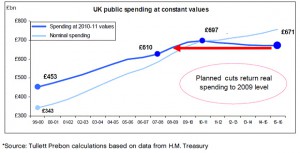With acknowledgement to Stephen Tall who is Co-Editor of Liberal Democrat Voice we reproduce his analysis of the UK economy over the next 5 days.
The economy is the big issue: it was at the last general election, it has dominated and will dominate this parliament, and it will be the big issue at the 2015 general election. Yet trying to get behind the political rhetoric to discover the economic reality is surprisingly tricky. The purpose of this post is to look at what I see as the top five myths currently being perpetuated about the economy, and to explain why I think our current debate is misleading the public and diverting us from finding proper answers.
Myth 1: UK public spending is reducing
So keen has been the Coalition and Labour (for their own different reasons) to talk up the extent of the Government’s spending cuts that the reality has been forgotten. Public spending is going up year-on-year under the Coalition, rising from £690bn in 2010-11 to £744bn (+8%) by 2014-15. If we allow for inflation, there will be a modest reduction: from £690bn to £668bn (-3%) by 2014-15.
That figure of £668bn public spending in the final year of this parliament will be higher than in every single year of the last Labour Government’s 13 years in office, bar its final one. Indeed, Coalition spending in 2014-15 would be higher even than that final Labour year (2009-10) if it were not for the increased cost in servicing the national debt.

(Graph from Burning our Money blog; data from Tullett Prebon economic and fiscal database.)
